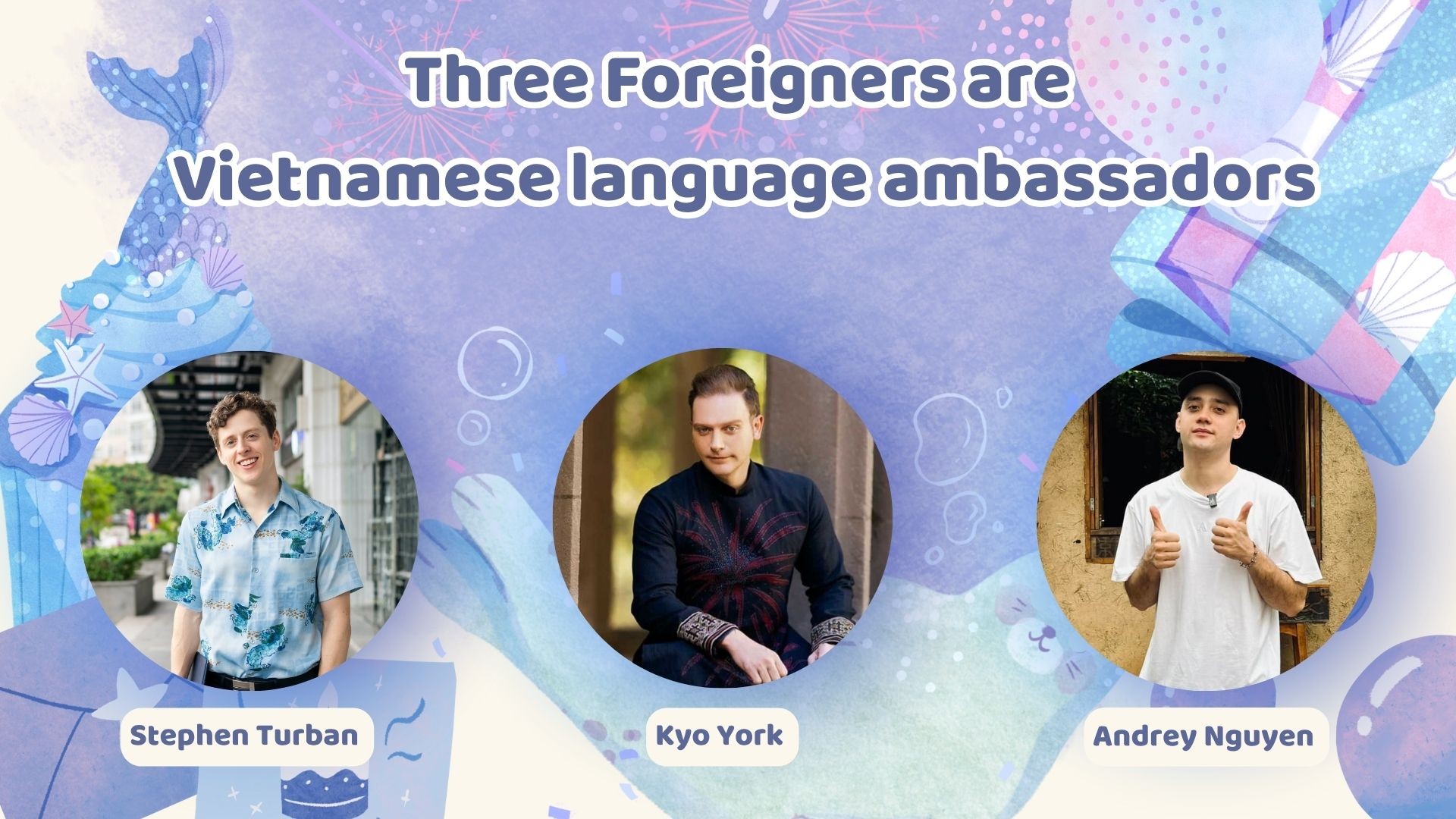 |
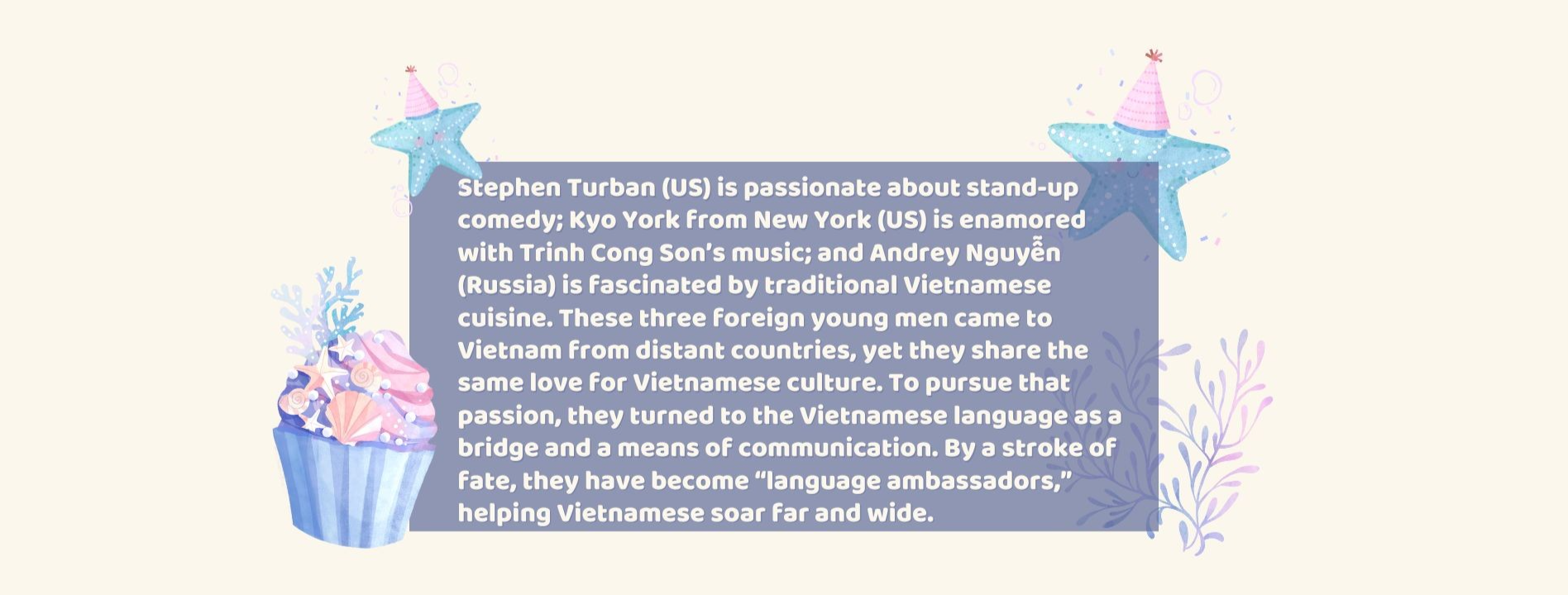 |
 |
|
“Hello everyone. Let me introduce myself a little: my name is Stephen, my Vietnamese name is Vu. I have been in Vietnam for four years.” With a confident voice, clear pronunciation, and cheerful eyes, Stephen Turban, a former Harvard University (USA) student, introduced himself on a stand-up comedy stage in Ho Chi Minh City (HCMC) in 2024. Four years earlier, on that same stage, the young man once made the audience burst into laughter when he accidentally pronounced “Vũ” as “Vú.” “Only afterward did I realize I had pronounced it wrong,” he recalled. “But it was a memorable moment.” Today, Stephen has become a familiar face in HCMC’s stand-up comedy scene under the stage name “Stephen Vu.” He performs in Vietnamese, bringing audiences relatable and witty stories. “The other day, I went shopping and greeted the staff with ‘Em chào chị.’ She looked surprised and said, ‘Good job!’” he recounted, prompting the audience to erupt in laughter. |
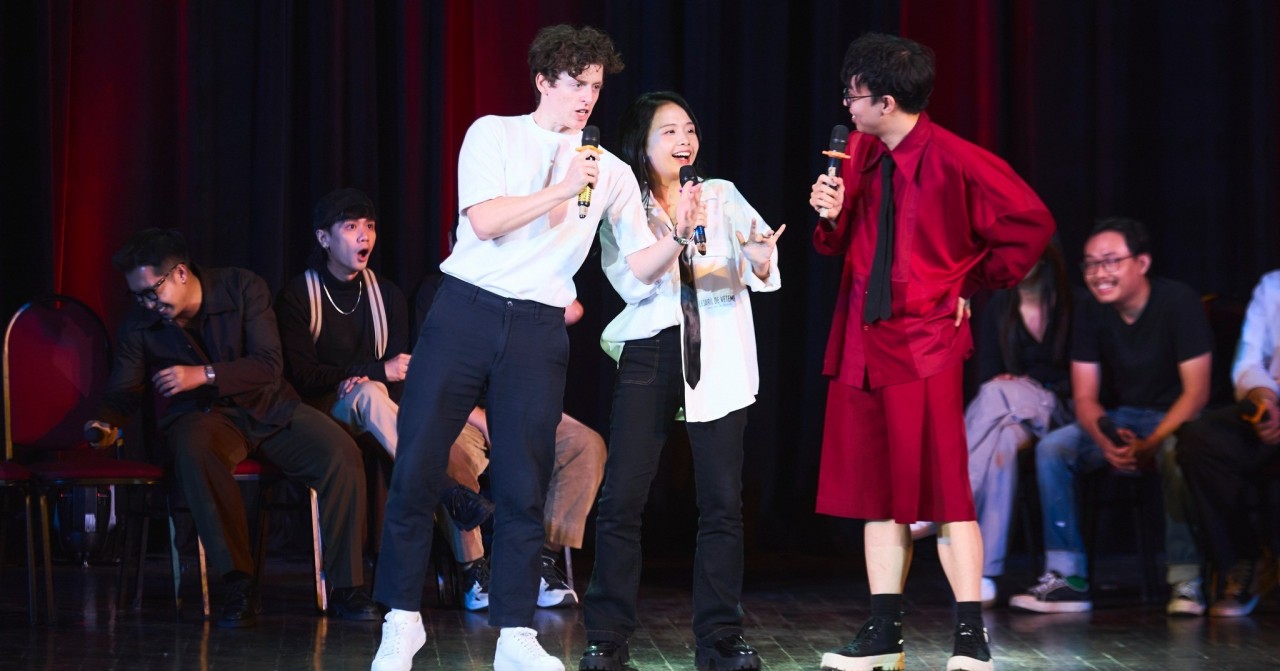 |
| Stephen Vu (in a white shirt, far left) during a performance at the Youth Cultural House in HCMC. |
|
Born in 1993 in Hawaii (USA), a Statistics graduate from Harvard University, formerly a consultant at McKinsey, and a PhD student at Harvard Business School, Stephen has a distinguished academic journey. In 2017, he came to Vietnam as a tourist and studied Vietnamese simply to understand the culture better, but eventually decided to stay long-term. “When I left Vietnam and went to the US or China, I kept thinking about Vietnam,” he said. “HCMC is my home. I’m certain I will be here for a long time.” In 2020, he co-founded Lumiere Education, which supports high school students worldwide in conducting research projects under the guidance of experienced mentors. Through this initiative, Vietnamese students and students from many other countries, have the opportunity to engage in advanced research in fields such as machine learning, cancer studies, and economics. Stephen shared that the energy and ambition of Vietnamese people made him fall in love with the country. “Vietnam has something very special. I don’t know how to describe it, but there’s a poem by Che Lan Vien that I really like: When we are here, it is just a place to live / When we leave, the land turns into our soul.” |
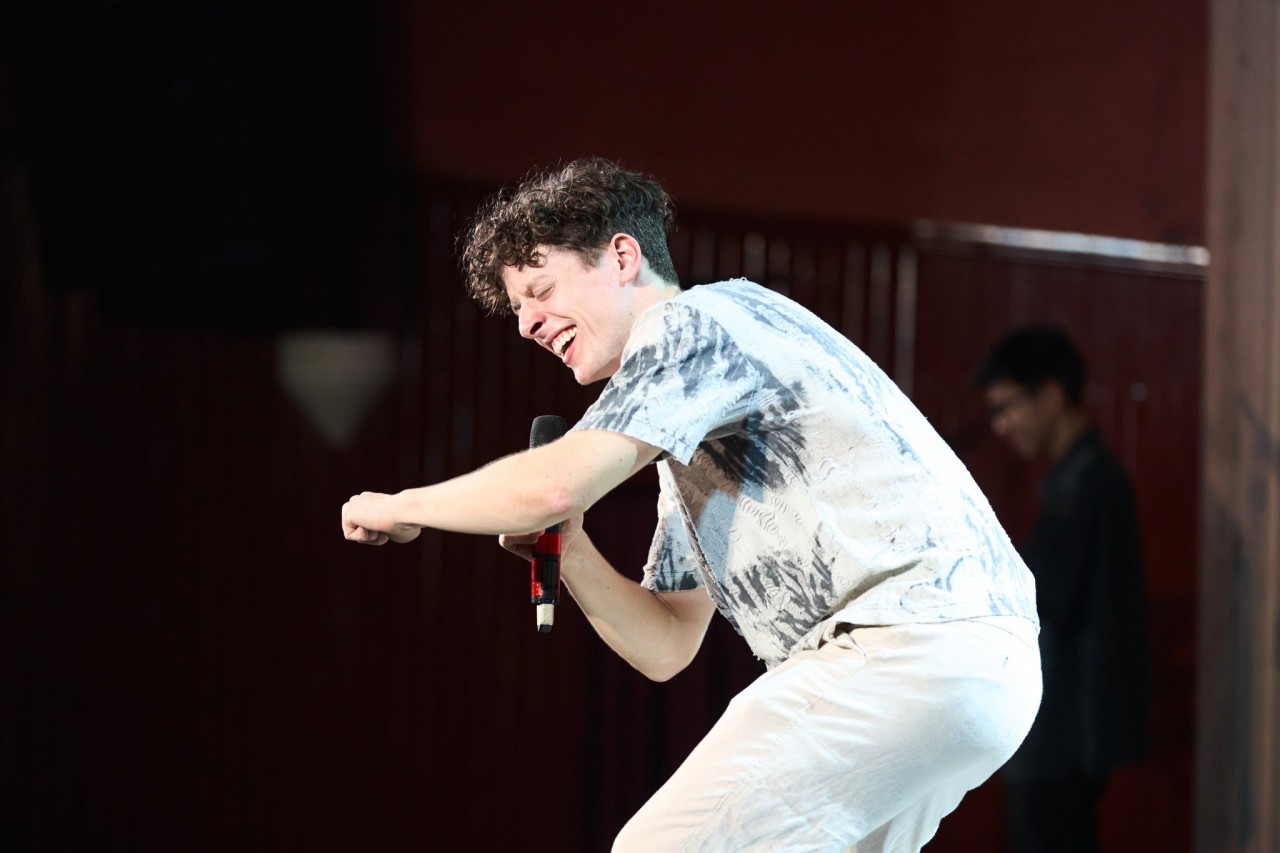 |
| Stephen Vu performing stand-up comedy. |
|
Stephen’s passion for stand-up comedy came by accident. While accompanying his Vietnamese teacher to watch the Saigon Teu comedy group perform at the Youth Cultural House (HCMC), he was immediately captivated by the art form. For nearly a year, he quietly attended performances, joined the group’s activities, and even asked to join their Zalo group so he could read scripts and learn how to improvise and handle situations on stage. One day, overcoming his hesitation, he boldly messaged the group: “Is there a chance for me to stand on stage?” “At the time, we thought he simply wanted to improve his Vietnamese - who would have thought he wanted to perform stand-up comedy in Vietnamese?” recalled Hien Nguyen, one of the group’s cofounders. Given the opportunity, Stephen worked diligently on his scripts, asking his two Vietnamese teachers to revise every line to make them natural and charming. Today, each of his performances is warmly received by audiences. On social media, hundreds of comments praise him: “So charming, Vu’s comedic timing is great,” or “Stephen is so delightful! Thank you for understanding Vietnamese well enough to perform stand-up!” |
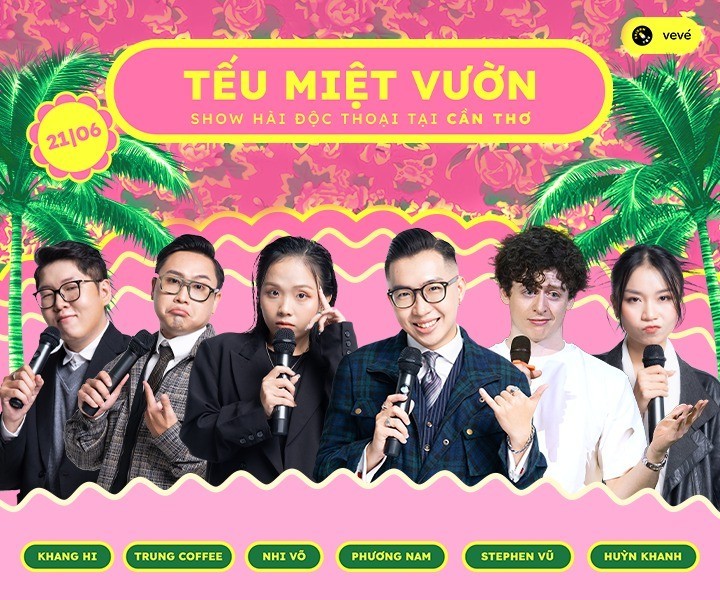 |
| Stephen Vu with members of the Saigon Teu stand-up comedy group. |
|
Vietnamese remains a challenge for Stephen. He says he only understands about 70% of the conversations among his friends in the group “because they use a lot of slang-totally Gen Z language.” To keep up, he always carries a small notebook filled with new words he hears, along with meanings and real-life usage examples. Offstage, friends jokingly call him the “Da Kao ward gentleman”-a nickname he loves. Stephen aims to understand 95% of the way Vietnamese people speak, expand his company to a 100-person team, and improve his performance skills. “I’m a living example of being ‘obsessed with Vietnam’-a Foreign Vietnamese enthusiast, an unofficial ambassador,” he said. |
 |
|
Unlike Stephen Vu, Kyo York, born in 1985 and originally from New York (USA), first came to Vietnam on a volunteer trip in 1999. From someone who spoke no Vietnamese, he gradually became fluent, learned to sing clearly, and eventually became a singer specializing in Vietnamese music. Kyo York shared that it was Trinh Cong Son’s songs that made him fall in love with the Vietnamese language and culture. Music became the bridge that helped him gain a deeper understanding of the Vietnamese people and soul. From there, the American singer decided to build a life in Vietnam, choosing a professional singing career as a way to give back to the place that had nurtured his love. |
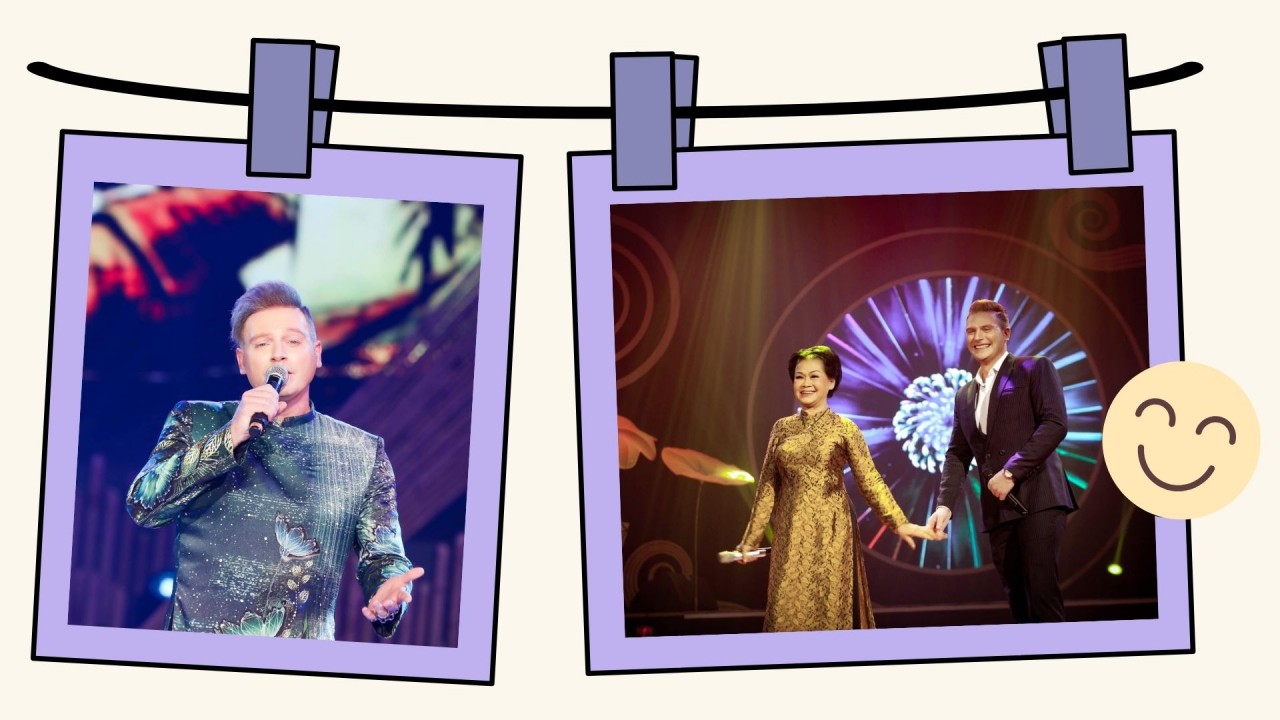 |
|
Singer Kyo York performing on stage. |
|
In the early days, it took him nearly 10 days to memorize and correctly pronounce a single song. “At first, I found Vietnamese music very difficult, from the meaning of the lyrics to the way words are articulated. I listened to recordings, learned from friends, and gradually understood what the songs were trying to convey,” he said. After more than 10 years, Kyo now needs only two days to learn and interpret a new song. For him, singing Vietnamese music is not only about delivering melodies but also about telling a story. “A singer is a storyteller through music. To sing well, you must understand why the composer wrote the piece and what they wanted to convey,” Kyo shared. Before performing, he always researches the context of the composition, the historical background, and the emotions of the songwriter in order to convey the song’s spirit accurately. If audiences once called him “the Westerner who sings Trinh music,” the name “singer Kyo York” has now become familiar. He is loved for his clear diction and emotional expression. |
 |
| Though a foreigner, Kyo York delights in Vietnam’s traditional customs. |
|
Kyo York openly expresses his pride in his journey of mastering Vietnamese: “Vietnamese is extremely difficult - tones, multiple meanings, and what you learn in theory differs from real life. I taught myself without formal classes, and it took more than two years before I became fluent.” For him, Vietnamese is something magical, helping him understand the culture and, above all, allowing him to sing in the language he loves. When challenging himself with folk music, he had to practice even harder: “For foreigners, speaking Vietnamese is already difficult, singing folk music is even harder. The melodies, the articulation, and the singing techniques are all different. I had to practice a lot,” he said. Thanks to guidance from friends, Kyo gradually learned to perform folk songs from both northern and southern Vietnam, surprising audiences with the sweetness and authenticity in his voice. |
 |
| With nearly 770,000 followers and 18.1 million likes on TikTok, “Anh Tây Ơi”-real name Andrey Nguyen, affectionately called An, has become a social media sensation for his Western appearance but “Vietnamese operating system.” His deep understanding of Vietnamese culture, language, and especially cuisine never fails to impress and amuse online audiences. |
|
Andrey buying banh te and bargaining like a pro. |
|
Born in Russia to a Russian mother and Vietnamese father, An was taught Vietnamese by his father from a young age. At six years old, he returned to Hanoi with his father and lived with his paternal grandparents. An grew up surrounded by stories of his homeland, the love of his grandparents, and the peaceful rhythm of life in Hanoi. During his first days at school, his “Western” appearance made classmates hesitant to talk to him. Only when they heard him speak Vietnamese—still imperfect at the time, did they gather around him, teaching him poems, playing tug-of-war, marbles, and jump rope. “Daily interaction with Vietnamese people helped me pronounce words correctly and gradually adapt to life,” An recalled. Growing up in the heart of Hanoi, the Russian–Vietnamese young man developed a passion for traditional cuisine. He often wandered through the small alleys of the Old Quarter, enjoying phở, sweet soups, coffee, stir-fried green rice, or fried fermented pork rolls just to “feel the rhythm of old Hanoi.” His curiosity and love for Vietnamese culture inspired him to start a TikTok channel, where he shares clips such as “a Westerner bargaining at the market,” “burning votive paper the right way,” or “trying balut for the first time.” In 2023 alone, these videos attracted nearly 30 million views. |
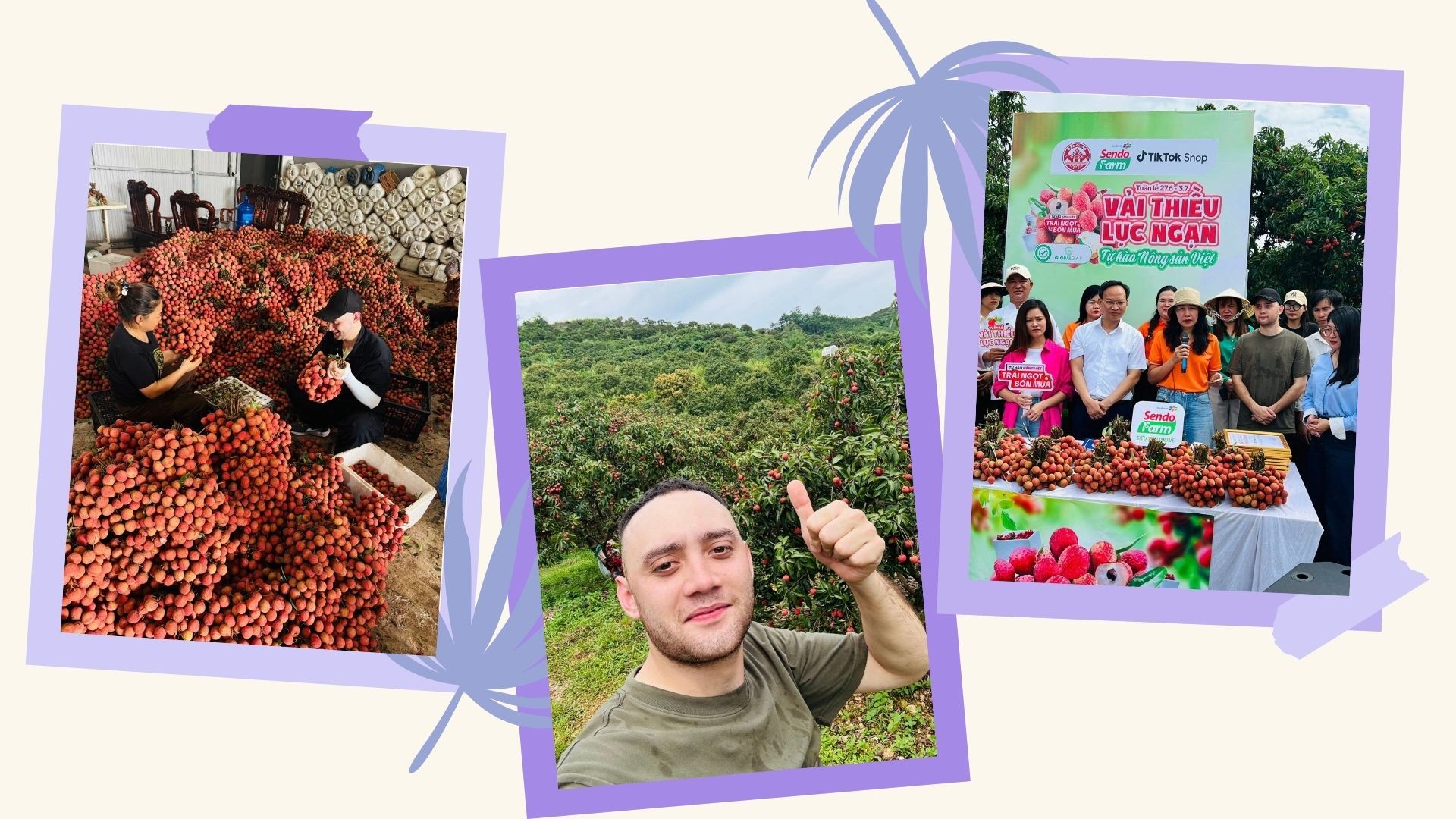 |
| TikToker Anh Tây Ơi during a livestream session at a Luc Ngan lychee orchard (Bac Giang), June 2025. |
|
Audiences adore An not only for his humor but because he lives like a true Vietnamese. The image of a Westerner wearing a conical hat, carrying a market basket, and chatting warmly with vendors has become his signature. An says this comes from his grandmother’s teaching: “If you don’t know something, just ask the locals. Speak sincerely, and you will be loved.” He applies this advice in every interaction and every video, making people see in him a sense of warmth, authenticity, and respect for Vietnamese culture. An’s everyday stories are always full of humor. Once, he jokingly reminded a friend of African origin to “stay in the right lane,” only for that friend to turn around and reply in flawless Vietnamese. “I was so surprised. I even asked for their number afterward to meet up for coffee,” An said. In early 2024, he registered to join the show “Vua tieng Viet” (Vietnamese Language King) to expand his vocabulary and improve his expression. His charming introduction made the audience burst into laughter: “Looking at me, people wonder: Is this guy from the Northwest or the Central Highlands? My configuration is fully Vietnamese, only the front-end interface looks Western.” After the competition, his Vietnamese became even more refined, and he began incorporating folk verses and proverbs into everyday conversation. |
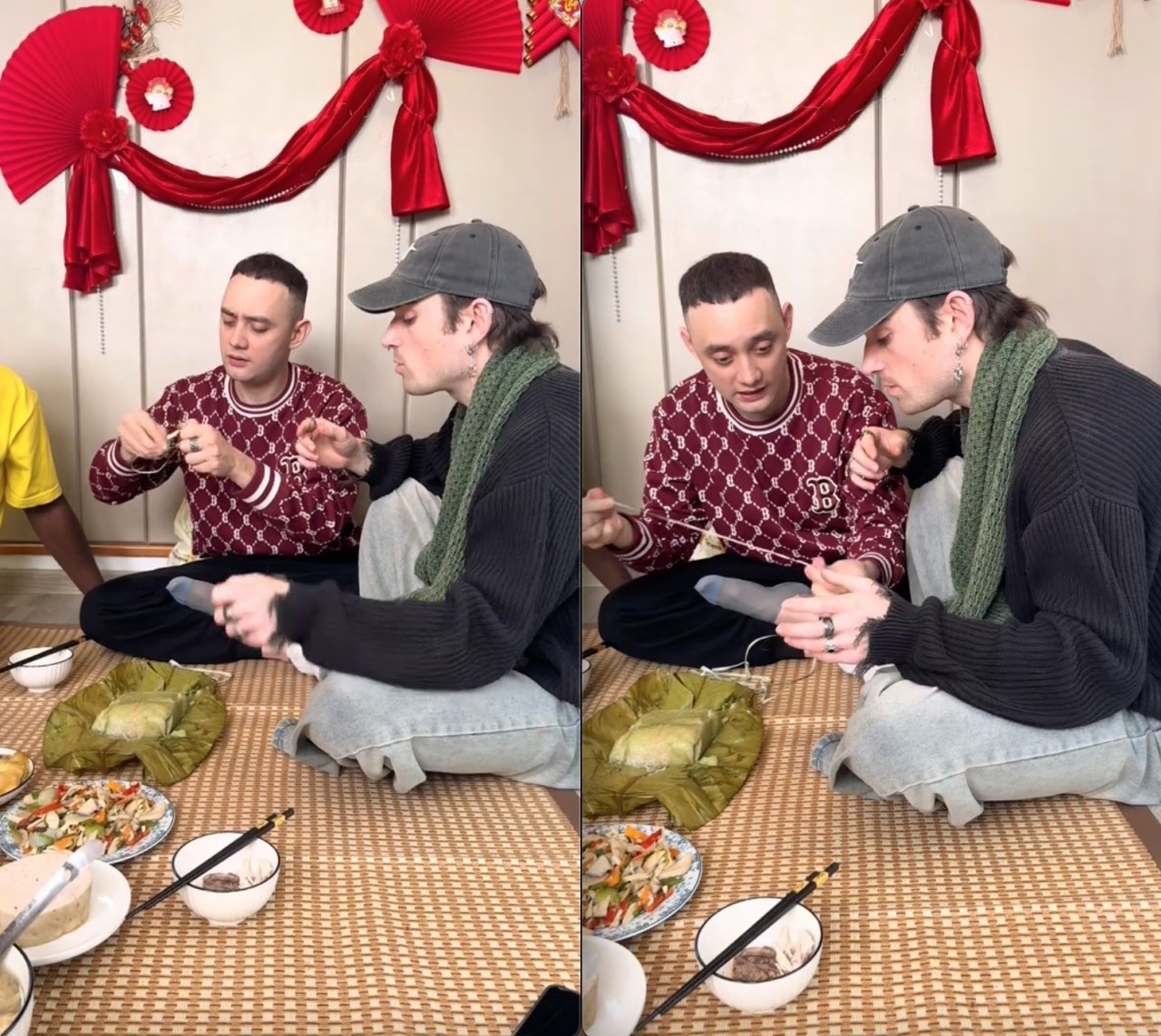 |
| TikToker Anh Tây Ơi teaching a foreign friend how to cut banh chung with bamboo strings. |
|
Not only does An spread his love for Vietnam to local audiences, he also helps international friends better understand Vietnamese culture. He has taken friends out for bia hơi, sat with them at sidewalk stalls, and given them traditional gift baskets filled with eggs, peanut candy, and salted dried apricots. “I’m fortunate to live a simple and happy life in Vietnam,” he shared. Three foreigners, each with his own journey and experiences, share one thing in common: they overcame language barriers to understand and tell the story of Vietnam in their own way. Learning from books, from everyday life, and from the simplest things, they have let Vietnamese become the heartbeat accompanying them on stage, in music, and in daily life. By Phan Anh Graphics: Mai Anh Published on: November 13, 2025 |